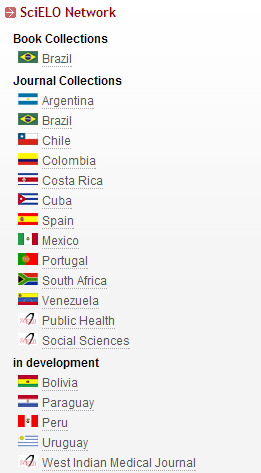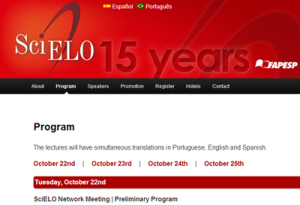By Abel L. Packer
On 13th August, the SciELO Network held the first of a series of online meetings which are taking place prior to the face-to-face meeting dealing with the future development of SciELO, which will take place on 22nd October during the SciELO 15 Years Conference. The meeting was attended by representatives from all the SciELO collection coordinations in the Ibero-American countries. A separate meeting will be held in English for the SciELO South African collection coordinators.
The objective of these preliminary meetings is to reach an agreement on the agenda of work to be carried out and the primary documents which will support the analyses, debates and decisions which will be made concerning the priority action lines which will drive the development and future operation of SciELO.
 Background
Background
As it completes its first 15 years of operation in 2013, the SciELO network has achieved significant results. The major objective of SciELO is to contribute to the progress of academic research by improving the communication of research results in national quality journals. National journals fulfill an important function which is to complement international journals as far the communication of research undertaken nationally is concerned. The specific objective of SciELO is to increase in a sustainable way the visibility, quality, use and impact of the journals it indexes. In addition, it contributes to the development of national capacity and infrastructures for information and scholarly communication. The principal functions undertaken by SciELO have been the indexing of academic journals based on strict quality control measures, the online open access publication of full text on the Web, the measurement of performance with regard to downloads and citations and Web interoperability with indexes, and the products and services used for the indexing of scholarly content.
In 2013, the SciELO Network of national journal collections was extended to 16 countries, 15 in Ibero-America and South Africa which, when taken as a whole, index around 1000 journals which currently publish more than 40,000 articles per annum. In total, the network has accumulated more than 400,000 articles over a period of 15 years, and during 2012 handled a daily average of more than 1,500,000 accesses and downloads. The SciELO collections, taken as a whole, occupy the first place in the Webometrics ranking of open access portals and perform very well when taken individually. Also when taken as a whole, the SciELO collections are the principal source of indexed journals in the Directory of Open Access Journals (DOAJ). The metadata for the SciELO journal articles, along with links to the full text, are updated weekly in Google Scholar, CROSSREF and DOAJ indexes and they are also added to the major international and regional bibliographic indexes such as The Web of Science, Scopus, PubMed and LILACS, etc. From October 2013, all the certified SciELO collections will be integrated into the SciELO Citation Index which will operate as part of the Web of Knowledge in conjunction with WoS and other international databases, both for searching as well as for the counting of citations received.
The SciELO network is also the embodiment of one of the major scholarly communication programs in developing countries. It also stands out as one of the major programs of international cooperation for the publication of open access academic journals.
Notwithstanding the advances which have been made, the SciELO Network faces two great challenges as far as its future development is concerned. The first challenge is to improve the performance of the management and operation of the national collections, as far as the development of collections according to SciELO’s quality criteria is concerned. For example, this could take the form of an academic committee representative of the national academic community which could be responsible for evaluating the journals which should be admitted and maintained in the collection, the processing and on-time publication of new journal issues, the timely adoption of updates to methodologies and technologies in the field of publishing, the advanced publication of articles prior to the mounting of the relevant journal on the site in order to promote the on-going publication of articles, the online processing of article submissions , the development of promotional plans and marketing, etc. The second challenge is to improve the performance of the SciELO Network journals which is under par when compared to journals in the developed countries. This observation is based on the bibliometric citation indicators which are found in international benchmark indexes such as The Journal Citation Reports (JCR) which are calculated using Web of Science, and the Scimago Journal Ranking which uses Scopus. In fact, around 90% of the SciELO journals appearing in the JCR and Scimago have an impact factor below the median for their respective subject areas.
There are many structural and specific factors which contribute to the under par performance of some collections and a significant portion of the journals. The management and operation of national collections are affected by the level of political and financial support they receive, by the available capacity of human resources and the operational infrastructure, and by the performance of the journals in general. The performance of the journals is dependent upon the quality and international relevance of the research output that they publish. It also depends upon the percentage of texts in the Spanish and Portuguese languages as well as the predominance of articles written by national researchers, and the small percentage of articles which are the result of international collaboration. In general, the great majority of academic journals continue to operate editorial processes which are characterized by a low level of professionalism, a low level of international integration and financial models with a low level of stability.
The SciELO/FAPESP Program, the collections and journals of the SciELO Network individually and together have developed efforts in the last few years in the direction of advancing and deepening the professionalism, the internationalization and the financial sustainability of the SciELO journals, of the collections and of the Network as a whole. In this sense, CONICYT Chile organized a meeting the 25-27th of June of this year with the participation of Margarita Ontiveros of CONACYT Mexico, Patricia Muñoz of CONICYT Chile and Abel Packer of the SciELO Program with the objective to develop a preliminary proposal of lines of action in support of the discussions of the SciELO Network. The proposal aims to establish a SciELO platform of common services that address all of the editorial, publishing, indexing and interoperability processes which will be available to SciELO journals. The proposal also considers the establishment of a training program for journal editors, evaluators and authors, and a program of dissemination and marketing, and of strengthening partnerships with institutions and international systems of scholarly communication.
Working Agenda for the SciELO Network Meeting
The working agenda for the SciELO Network meeting is oriented towards the definition of the priority lines of action regarding the professionalization, internationalization and sustainability of the journals, collections and the SciELO Network. It encompasses the following aspects: evaluation and performance of the SciELO Network upon reaching its 15 year anniversary; the state of development and the future path of the SciELO platform for indexing, publishing and interoperability; the cooperation of libraries in the on-going development of SciELO; the management of the journals and of the common services of the SciELO platform, and the priority lines of action for the future development of SciELO.
The evaluation of the performance of the SciELO Network will be carried out using 4 approaches: first, a self-analysis of the performance of the national collections undertaken by the respective coordinators using the structured SWOT analysis methodology of identifying the strengths, weaknesses, opportunities and threats that affect the development and operation of the national collections; second, a webometric type of analysis of the performance of the SciELO collections to measure the presence on the Web of each one of the collections; third, a bibliometric type of analysis with the objective of measuring the average performance of the journals in the national collections; and, four, the analysis of the evaluation of the performance of the SciELO Chile Collection.
The analysis of the state of development of the SciELO platform and the expected progress will be presented in accordance with the steps in the production flows of the academic journals, including: (a) quality control in indexing, covering the evaluation for the inclusion of new journals and for the retention of those journals already indexed; (b) the online management of submissions by means of systems and services certified by SciELO according to its criteria of operation; (c) the editing of texts, including translation; (d) the preparation and formatting of the full texts for XML, HTML, PDF and EPUB outputs; (e) the interoperability with the principle indexes and bibliographic systems; (f) the new Web and mobile interface; (g) the new technical operating platform for the SciELO collections; and, (h) the training program for journal editors, evaluators and authors.
University and research center libraries play an important role in the intermediation and training in the processes of access, publication and evaluation of academic information as well as of the researchers, professors, editors and students. The strengthening and broadening of the visibility and use of the SciELO collections will be more successful with the active participation of university library systems, of specialized libraries and of librarians together with the research and teaching communities. At the same time, libraries fulfill an essential role in support of the editing, publication, dissemination and indexing of the journals of the universities and research centers. This panel will analyze lines of action to broaden the contribution of libraries to the future development of academic journals and of the SciELO Network.
The development of the common platform of SciELO services for editing and publishing opens a unique opportunity for a large part of academic journals to streamline the activities and processes of production, and focus on editorial activities related to the evaluation of submissions and the dissemination of the journals themselves. The view is that the SciELO platform should offer services that measure up to international standards at reasonable cost. However, the adoption of the common platform represents changes and challenges for the journal publishers and editors, most of which have traditionally operated production independently with in-house or contracted out-solutions. This panel will analyze the different demands and concerns of journal editors in regard to the adoption of the common services which will be operated or intermediated by the SciELO collections.
Finally, the agenda will conclude with the joint definition of the lines of action that should guide the development and operation of the SciELO Network in the coming years. This definition should take place no later than October 10 so that in the face-to-face meeting of the SciELO Network the representatives of the national directorates will be able to dedicate their time to refining, finalizing and approving the lines of action.
Translated from the original in Portuguese by Nicholas Cop Consulting.
Como citar este post [ISO 690/2010]:


















Pingback: Brazilian Research “world’s most open.” | Science for Brazil